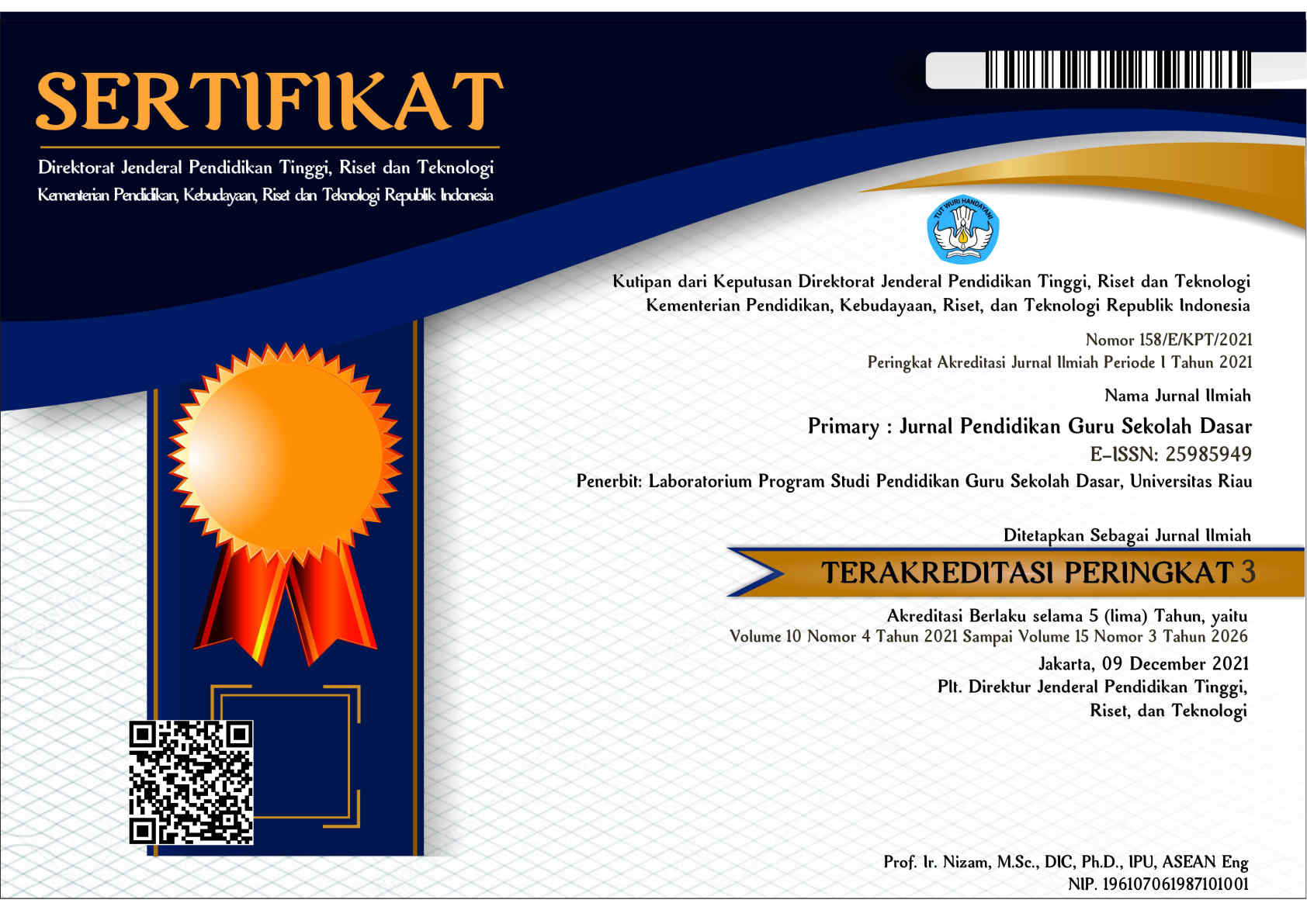MATHEMATICS LEARNING PROCESS AND RESULTS OF ELEMENTARY SCHOOL STUDENTS IN LIMITED FACE-TO-FACE LEARNING
Abstract
The aim of the research is to analyze the learning process and the learning outcomes of students in limited face-to-face learning. The research method used was descriptive qualitative, the research subjects were class V teachers and fifth grade students. The research instruments used were interview text, observation, documentation. The validity of the data obtained was tested using the triangulation test, and the analysis process used the Miles and Huberman model, namely data reduction, data presentation and conclusion. The results of the study show that the implementation of limited face-to-face learning at elementary school is carried out in compliance with health protocols. The learning process in the classroom the teacher explains the material briefly, concisely and clearly, after that gives examples of practice questions to students. In the learning activities the teacher uses the talking stick learning method, lectures and explanations of sample questions. The learning activities in the class are quite active, and the learning outcomes achieved by students have been able to reach the specified KKM. However, in the learning process it is still teacher center, so it needs to be developed into a student center so that the learning process is more meaningful for students. So that students are given the freedom to explore knowledge independently more deeply and improve self-quality.
Keywords
Full Text:
PDFReferences
Bao, X., Qu, H., R, Z., & Hogan, T. (2020). Literacy loss in kindergarten children during COVID-19 school closures. SocArXiv.
Cahyani, A., Listiana, I. D., & Larasati, S. P. D. (2020). Motivasi Belajar Siswa SMA pada Pembelajaran Daring di Masa Pandemi Covid-19. IQ (Ilmu Al-Qur’an): Jurnal Pendidikan Islam. https://doi.org/10.37542/iq.v3i01.57
Dakhi, A. S. (2020). Peningkatan Hasil Belajar Siswa. Jurnal Education and Development, 8(2), 468–470.
Dewi, W. A. F. (2020). Dampak COVID-19 terhadap Implementasi Pembelajaran Daring di Sekolah Dasar. Edukatif : Jurnal Ilmu Pendidikan, 2(1), 55–61.
Engzell, P., Frey, A., & Verhagen, M. D. (2021). Learning loss due to school closures during the COVID-19 pandemic. Proceedings of the National Academy of Sciences of the United States of America. https://doi.org/10.1073/PNAS.2022376118
Fadilla, A. N., Relawati, A. S., & Ratnaningsih, N. (2021). Problematika Pembelajaran Matematika Daring Di Masa Pandemi Covid-19. Jurnal Jendela Pendidikan, 01(02), 48–60.
Fauzi, I., & Khusuma, I. H. S. (2020). Teachers’ Elementary School in Online Learning of COVID-19 Pandemic Conditions. Jurnal Iqra’ : Kajian Ilmu Pendidikan, 5(1), 58–70. https://doi.org/https://doi.org/10.25217/ji.v5i1.914
FITRIA, M., & Fitriana, D. (2019). Penggunaan Metode Talking Stick untuk Meningkatkan Kampuan Hands-On Siswa pada Materi Bangun Ruang di MI Islamiyah Dinoyo Terdepan Lamongan. ELEMENTARY: Islamic Teacher Journal. https://doi.org/10.21043/elementary.v7i2.6108
Gunawan, Kustiani, L., & Hariani L.S. (2018). Faktor-Faktor Yang Mempengaruhi Hasil Belajar Siswa. Jurnal Penelitian dan Pendidikan IPS (JPPI) 12(1): 14-22.
Hardani, Auliya, N. H., Andriani, H., Fardani, R. A., Ustiawaty, J., Utami, E. F., … Istiqomah, R. R. (2020). Metode Penelitian Kualitatif & Kuantitatif. Yogyakarta: CV. Pustaka Ilmu.
Herawati. (2018). Memahami Proses Belajar Anak. Jurnal Ar-Raniry, 4(1), 27–48.
Kemendikbudristek. (2021). Panduan Penyelenggaraan Pembelajaran PAUDDIKDASMEN Di Masa Pandemi Covid-19. Jakarta: Kementerian Pendidikan, Kebudayaan, Riset, dan Teknologi Kementerian Agama.
Mardapi, D., Hadi, S., & Retnawati, H. (2015). Menentukan Kriteria Ketuntasan Minimal Berbasis Peserta Didik. Jurnal Penelitian Dan Evaluasi Pendidikan, 19(1).
Maulidya, N. S., & Nugraheni, E. A. (2021). Analisis Hasil Belajar Matematika Peserta Didik Ditinjau dari Self Confidence. Jurnal Cendekia : Jurnal Pendidikan Matematika. https://doi.org/10.31004/cendekia.v5i3.903
Mira, Sabilah, A., Royani, S., Sopiah, Sahriani, S., Rahmi, … Marta, E. (2021). Pembelajaran Daring Terhadap Hasil Belajar Matematika di Sekolah Dasar. Jurnal Mimbar PGSD Undiksha, 9(2), 351–357.
Miswar. (2017). Teori Pembelajaran CBSAK Sebagai Sebuah Teori Alternatif. Jurnal BASICEDU, 1(2), 32–41.
Muslina. 2018. Peningkatan Hasil Belajar Matematika Siswa Kelas II SD Melalui Model Pembelajaran Kooperatif Tipe Student Team Achievement Division
Nissa, S. F., & Haryanto, A. (2020). Implementasi Pembelajaran Tatap Muka di Masa Pandemi Covid-19. Jurnal IKA : Ikatan Alumni PGSD UNARS, 8(2), 402–409.
Nurintiyas, P. W. (2020). Analisis Hasil Belajar Matematika pada Siswa Kelas IV SDN Demangan 2 Bangkalan. Prosiding Nasional Pendidikan: LPPM IKIP PGRI Bojonegoro, 537–543.
Onde, et all. (2021). Analisis Pelaksanaan Pembelajaran Tatap Muka Terbatas (TMT) di masa New Normal terhadap Hasil Belajar Matematika di Sekolah Dasar. Edukatif : Jurnal Ilmu Pendidikan, 3(6), 4400-4406.
Pratiwi, W. D. (2021). Dinamika Learning Loss: Guru dan Orang Tua. Jurnal Edukasi Nonformal, 2(1), 147–153.
Sadikin, A., & Hamidah, A. (2020). Pembelajaran Daring di Tengah Wabah Covid-19. BIODIK: Jurnal Ilmiah Pendidikan Biologi, 6(2), 214–224. https://doi.org/https://doi.org/10.22437/bio.v6i2.9759
Sugiyono. (2015). Metode Penelitian Kuantitatif, Kualitatif, dan R&D. Bandung: Alfabeta.
Sulistyaningrum, R., Sutama, & Desstya, A. (2021). Analysing Skills of Planning, Conduct, and Assessment In Teachers During Online Mathematics Teaching. Profesi Pendidikan Dasar, 8(1), 63–74. https://doi.org/10.23917/ppd.v8i1.13108
Wandini, R. R., & Banurea, O. K. (2019). Pembelajaran Matematika Untuk Calon Guru MI/SD. Medan: CV. Widya Puspita.
DOI: http://dx.doi.org/10.33578/jpfkip.v12i2.9205
Refbacks
- There are currently no refbacks.
Copyright (c) 2023 Ariani Haffidah Lestari

This work is licensed under a Creative Commons Attribution-NonCommercial-ShareAlike 4.0 International License.
____________________________________________________________
Primary: Jurnal Pendidikan Guru Sekolah Dasar
Secretariat
Program Studi Pendidikan Guru Sekolah Dasar
Gedung B1, FKIP Universitas Riau
Kampus Bina Widya Km. 12,5 Simpang Baru Panam
Pekanbaru Riau Indonesia 28293
e-mail : primary@ejournal.unri.ac.id



